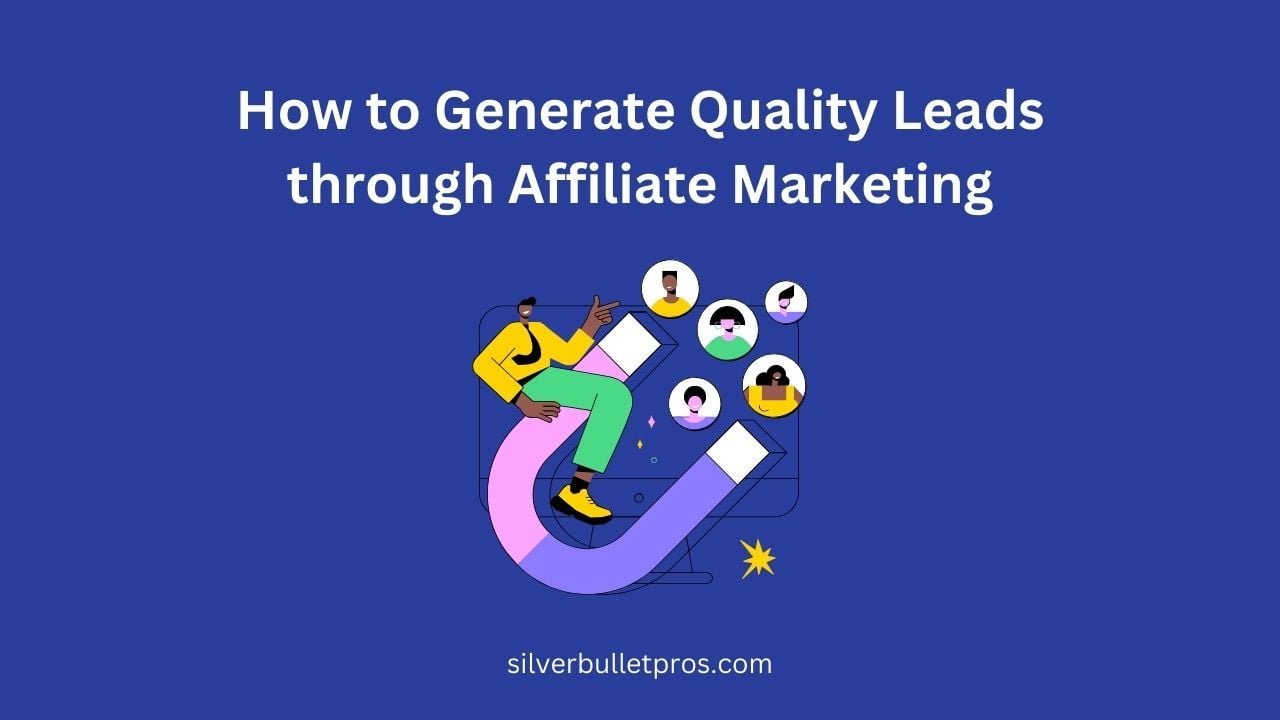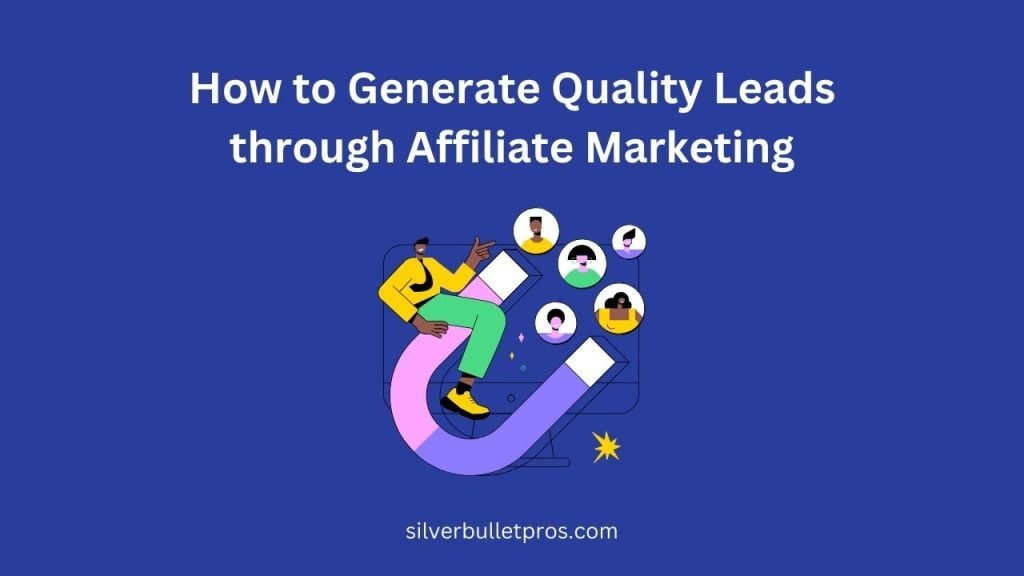

Affiliate marketing is a performance-based marketing strategy where a business rewards affiliates for driving leads or sales through their referrals. It's an effective way to generate quality leads and increase revenue without excessive upfront costs.
Successful affiliate marketing requires strategic planning and execution. It involves partnering with the right brands, creating compelling content, leveraging multiple channels, and continuously optimizing campaigns.
Affiliate marketing offers a potent solution by tapping into the power of influential content creators and marketers who can promote your products or services to their targeted audiences. Through this comprehensive guide, I aim to provide actionable strategies for leveraging affiliate marketing to drive high-quality leads to your business. From identifying the right partners and niches to creating engaging content and optimizing your campaigns, this guide will equip you with the knowledge to maximize the potential of affiliate marketing for lead generation.
A Guide to Effective Affiliate Marketing for Lead Generation
To effectively generate quality leads through affiliate marketing, you need to have a well-rounded strategy that encompasses various elements. Here's a step-by-step guide to help you get started.
1. Identify Your Target Audience and Niche
Understanding your target audience is paramount for successful affiliate marketing. Take the time to define your ideal customer persona, including their demographics, interests, pain points, and behaviors. This information will guide you in selecting the most relevant niches and affiliate programs to partner with.
For example, if you're targeting tech-savvy millennials, you might focus on niches like consumer electronics, productivity apps, or software solutions. By aligning your affiliate efforts with your target audience's interests, you'll be able to create more resonant and effective campaigns.
2. Partner with the Right Brands and Merchants
Carefully evaluate potential affiliate partners to ensure their products or services align with your audience's needs and preferences. Look for reputable brands with high-quality offerings and strong customer satisfaction ratings. Additionally, consider factors like commission rates, cookie duration, and the availability of marketing materials.
For instance, if you're in the fitness niche, partnering with reputable athletic apparel brands or fitness equipment manufacturers can be a strategic move. Their products are likely to resonate with your audience, increasing the chances of generating quality leads.
3. Create High-Quality Content
Content is the backbone of successful affiliate marketing campaigns. Develop informative, engaging, and valuable content that resonates with your target audience. This can include blog posts, product reviews, comparisons, tutorials, or even videos and podcasts.
When creating content, focus on providing genuine value and addressing your audience's pain points or interests. For example, if you're promoting a productivity app, create content that offers tips and strategies for improving time management or increasing productivity. By offering valuable insights, you'll build trust with your audience and increase the likelihood of generating quality leads.
4. Use a Variety of Marketing Channels
To maximize your reach and attract a diverse range of leads, leverage multiple marketing channels. This can include:
- Email marketing
- Social media platforms
- Influencer partnerships
- Paid advertising (e.g., Google Ads, Facebook Ads)
- Search engine optimization (SEO)
By diversifying your marketing efforts, you'll increase your chances of reaching potential customers through their preferred channels. Additionally, experiment with different content formats and strategies to determine what resonates best with your audience.
5. Track and Optimize Your Campaigns
Continuously monitor and analyze the performance of your affiliate marketing campaigns. Track metrics such as click-through rates, conversion rates, and revenue generated. This data will help you identify which strategies and content pieces are driving the most quality leads, allowing you to optimize and refine your approach accordingly.
Leverage tools like Google Analytics, affiliate tracking software, or the analytics provided by your affiliate networks to gain valuable insights. Regularly test and iterate on your campaigns, adjusting elements like messaging, visuals, and targeting to improve performance.
6. Leverage Social Media
Social media platforms offer a powerful opportunity to connect with your target audience and promote your affiliate offers. Engage with your followers by sharing valuable content, participating in relevant discussions, and leveraging influencer marketing.
For example, if you're promoting fitness products, you could collaborate with fitness influencers or join active fitness communities on social media. By establishing a strong presence and providing value, you'll build trust and credibility, ultimately increasing the likelihood of generating quality leads.
7. Build Relationships with Influencers
Influencer marketing can be a game-changer for affiliate marketers. Identify influential individuals within your niche who have a strong following and align with your target audience. Collaborate with them to promote your affiliate offers through sponsored posts, product reviews, or other content collaborations.
When partnering with influencers, ensure that their values and brand align with yours. Additionally, provide them with accurate information, marketing materials, and any necessary support to ensure a seamless promotion.
8. Experiment with Different Lead Generation Techniques
While content marketing and social media promotion are essential, don't be afraid to explore other lead generation techniques. Consider strategies like:
- Webinars or virtual events
- Contests or giveaways
- Lead magnets (e.g., free ebooks, guides, or resources)
- Email list building
- Retargeting campaigns
By diversifying your lead generation tactics, you'll increase your chances of reaching potential customers at various stages of the buyer's journey, ultimately driving more quality leads to your affiliate offers.
How to Choose the Right Affiliate Programs
Selecting the right affiliate programs is crucial for success. Here are some key factors to consider:
- Relevance: Ensure the products or services align with your niche and target audience's interests.
- Commission rates: Compare commission rates across programs to maximize your earnings potential.
- Cookie duration: Longer cookie durations increase the chances of earning commissions from returning customers.
- Brand reputation: Partner with reputable brands that offer high-quality products or services.
- Marketing materials: Look for programs that provide robust marketing materials, such as banners, product descriptions, and promotional assets.
- Tracking and reporting: Evaluate the tracking and reporting capabilities offered by the affiliate program to monitor your performance effectively.
How to Build a Valuable Affiliate Marketing Business
Building a valuable affiliate marketing business requires a strategic and long-term approach. Here are some key steps:
- Define your niche: Specialize in a specific niche or industry to establish yourself as an authority and cater to a targeted audience.
- Develop a strong brand: Create a professional and recognizable brand presence, including a website, social media profiles, and consistent branding elements.
- Provide exceptional value: Consistently create high-quality, informative, and engaging content that addresses your audience's needs and pain points.
- Build an email list: Grow and nurture an email subscriber list to maintain direct communication with your audience and promote your affiliate offers.
- Diversify your income streams: While affiliate marketing can be lucrative, explore other revenue streams like sponsored content, digital products, or consulting services to create a well-rounded business model.
- Stay up-to-date: Stay informed about industry trends, changes in affiliate program policies, and best practices to adapt your strategies accordingly.
How to Scale Your Affiliate Marketing Efforts
As your affiliate marketing business grows, you'll need to scale your efforts to maximize your earnings potential. Here are some strategies to consider:
- Outsource or hire assistance: Delegate tasks such as content creation, social media management, or administrative work to freelancers or virtual assistants.
- Automate processes: Leverage tools and software to automate repetitive tasks, such as email marketing, social media scheduling, or tracking and reporting.
- Expand your content offerings: Diversify your content formats by creating videos, podcasts, webinars, or online courses to reach a broader audience.
- Explore new marketing channels: Continuously research and experiment with new marketing channels, such as influencer collaborations, paid advertising, or emerging social media platforms.
- Partner with other affiliates: Collaborate with complementary affiliates to cross-promote each other's products or services and reach new audiences.
- Invest in professional development: Attend industry events, take courses, or seek mentorship to enhance your skills and stay ahead of the competition.
How to Create Targeted Affiliate Marketing Content
Creating targeted and effective affiliate marketing content is essential for driving quality leads. Here are some tips:
- Understand your audience: Conduct thorough research to gain insights into your target audience's interests, pain points, and preferences.
- Identify their search intent: Analyze the search queries and keywords your audience uses to understand their intent and create content that directly addresses their needs.
- Provide in-depth reviews and comparisons: Create detailed product reviews, comparisons, and buying guides that help your audience make informed purchasing decisions.
- Leverage keyword research: Use keyword research tools to identify relevant, high-volume keywords and incorporate them naturally into your content.
- Address common objections: Anticipate and address common objections or concerns your audience might have about the products or services you're promoting.
- Incorporate visuals: Use high-quality images, videos, or infographics to enhance the visual appeal and engagement of your content.
- Optimize for search engines: Follow best practices for on-page SEO, including optimizing titles, meta descriptions, headings, and internal linking.
How to Automate Your Affiliate Marketing Processes
Automating certain processes can significantly streamline your affiliate marketing efforts and save time. Here are some strategies to consider:
- Email marketing automation: Use email marketing platforms to set up automated email sequences, such as welcome series, nurture campaigns, or promotional offers.
- Social media scheduling: Leverage social media scheduling tools to pre-plan and automatically publish your content across multiple platforms.
- Affiliate link management: Utilize link management tools to easily create, track, and organize your affiliate links across various channels.
- Content repurposing: Automate the process of repurposing your content into different formats, such as converting blog posts into videos or podcasts.
- Lead capture and nurturing: Implement lead capture forms and automate the lead nurturing process by sending targeted content and offers based on the lead's behavior and interests.
- Performance tracking: Integrate analytics and reporting tools to automatically track and analyze the performance of your affiliate campaigns, enabling data-driven optimization.
How to Drive Traffic to Your Affiliate Marketing Website
Driving targeted traffic to your affiliate marketing website is crucial for generating quality leads and conversions. Here are some effective strategies:
- Search engine optimization (SEO): Optimize your website and content for relevant keywords to improve your search engine rankings and attract organic traffic.
- Paid advertising: Leverage platforms like Google Ads, Facebook Ads, or native advertising networks to run targeted paid campaigns and drive relevant traffic to your website.
- Social media marketing: Actively engage with your target audience on social media platforms, share valuable content, and participate in relevant communities to build brand awareness and drive traffic.
- Influencer collaborations: Partner with influential individuals or brands in your niche to leverage their audiences and drive referral traffic to your website.
- Email marketing: Build and nurture an email list to promote your affiliate offers and drive traffic back to your website through targeted campaigns.
- Guest blogging: Contribute high-quality content to relevant, high-authority websites in your niche and include backlinks to your website to drive referral traffic.
- Content promotion: Actively promote your content through various channels, such as social media, email newsletters, or content syndication platforms, to increase visibility and drive traffic.
By implementing these strategies, you can effectively drive targeted traffic to your affiliate marketing website and increase the chances of generating quality leads and conversions.